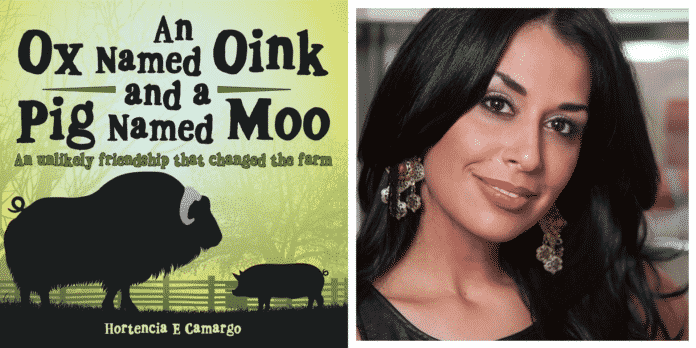McAllen native Hortencia Camargo recently published the first book of her new children’s book series that aims to educate youngsters about hot button topics.
The series begins with “An Ox Named Oink and a Pig Named Moo,” which teaches kids about social climate issues. The story follows the adventures of an ox named Earl, and a pig named Mortimer who learn how to accept their own faults and differences. Mortimer’s ability to forgive others changes the world on the farm and the future, and the duo learns about the strength in courage and compassion.
Her next book will focus on illegal immigration and child separation.
Camargo, a mother of four, is a published columnist, and former community chair for local organization, Women Executives RGV. She is also currently involved in efforts to support renewable energy and wind farms.
What inspired you to write this book?
Being a mother is what truly inspired me to write this book. I was given the great blessing of having four sons and the task to make them well-mannered, good, kind, compassionate men willing, and eager to lead others to what is right. Summarize your book in one to three sentences as if you were speaking to someone unfamiliar with your book and its topic. “An Ox named Oink and a Pig named Moo” utilizes satire to convey to young readers the harsh reality of racism and prejudice that is still abhorrently acceptable in today’s society. Readers will close the book both torn and complete as the story unravels how bravery, acceptance, and compassion can change the world amidst unbearable pain.
What is the central topic of the book?
To truly end racism, we must change the mindset of growing children. “An Ox Named Oink and a Pig named Moo” will open the reader’s mind to the endless possibilities of love and acceptance of all, especially to those who are different.
Why do you think that this book will appeal to readers?
Racism is a paramount issue that negatively affects society as a whole. This book helps the young reader face the challenging questions about inequality in our communities and homes and the baseless justification of those views.
How is your book relevant in today’s society?
Racism, inequality, and bigotry are regretfully alive and well in today’s society. The only real way to address systemic racism is to acknowledge that it is born and bred from home. Parents must accept their role for personal hatred of one another. Society must advocate collectively to demand accountability from parents and do a better job educating caregivers and guardians to accept and understand their role in the current, past, and on-going hatred in the world today. The only way to end racism is to change the mindset of the young. Children are born absent hate; it’s taught to them; the blame solely falls on the parents. It’s my prayer this book plants a seed of hope, compassion, and forgiveness, and that those traits be shared and multiplied throughout the upcoming generations.
What makes your book different from other books like it?
It allows very young readers to understand that being different is a beautiful thing. The reader will grasp the understanding that what makes us different is what makes us exactly the same, while understanding that judging others in any scope or form is wrong.
What do you want readers to take away from your writing?
Racism is wrong, arrogant and evil and is strictly a product of parenting. Parents must understand that the root of racism starts at home and the end to it starts with them. This book sheds light on the fact that systematic racism ends when tangible action is taken to fight against it.
How did you learn about the topic?
I was blessed to have been born as a Hispanic woman in deep South Texas. Racism does not live here; however, the fear I have of it is carried with me always when I leave home. In a perfect world, my four sons will live their life absent that reality.




